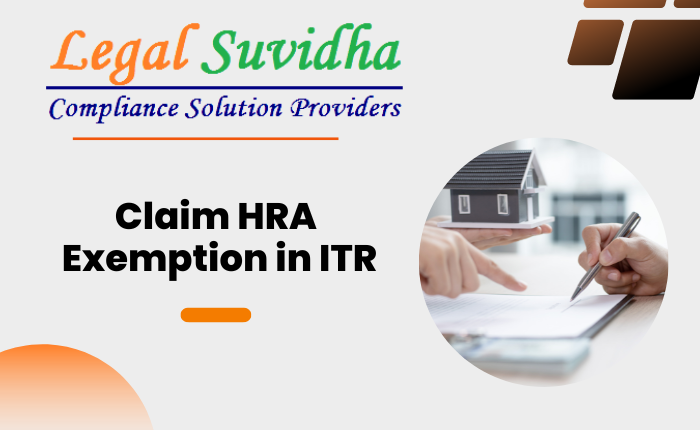As you are likely aware, House Rent Allowance (HRA) is a valuable benefit provided to salaried employees, forming a significant component of their overall compensation package.
- This allowance serves a crucial purpose in assisting employees who work and reside in rented accommodations.
- By providing financial support towards the expenses incurred in renting a place to live, HRA eases the burden of housing costs and contributes to a more stable and comfortable living arrangement for the employees.
- However, it is essential to note that this allowance is only applicable to individuals who are living in rented properties.
- If an employee resides in a property they own, they would not be eligible to receive HRA benefits.
- One of the significant advantages of a House Rent Allowance is its potential in reducing an individual’s Income Tax Liability during the process of Income Tax Return (ITR) filing.
- By correctly claiming HRA exemption, employees can significantly lower their taxable income, resulting in reduced tax obligations.
HRA for Self-Employed Individuals:
For those who are self-employed and not classified as salaried employees, there is still a way to benefit from deductions and tax advantages related to House Rent Allowance. This provision is known as Section 80 GG, which allows self-employed individuals to claim deductions for rent paid, subject to certain conditions and limits.
HRA for Salaried Individuals:
House Rent Allowance (HRA) is a beneficial provision under Section 10 (13A), rule number 2A, of the Income Tax Act, specifically designed for gainfully employed individuals who receive a consistent monthly salary.
- This provision permits such individuals to seek tax exemptions on the HRA they receive.
- Given that the HRA forms a substantial component of their overall salary, it is of utmost importance for salaried individuals to adhere diligently to their respective company’s policies while availing themselves of these tax exemptions.
- By doing so, they can ensure compliance with the relevant regulations while optimizing their tax benefits within the bounds of the law.
Importance of Housing Rent Allowance in Income Tax Return (ITR) Filing
Housing Rent Allowance (HRA) holds significant importance in the context of filing Income Tax Returns (ITR), as it offers several benefits that can substantially reduce your tax liabilities. Here are compelling reasons why claiming HRA is advantageous:
Reduction in Taxable Income:
HRA provides a favorable tax treatment, wherein a portion of the allowance is exempt from taxation, subject to certain limits. The specific limit is determined based on factors such as your salary, the amount of rent paid, and the city of residence. By availing of this exemption, you can effectively deduct the HRA amount from your total income, leading to a reduction in taxable income. Consequently, this results in a lower tax liability.
Augmented Disposable Income:
Incorporating HRA into your tax return can augment your disposable income substantially. By reducing the taxable income, the tax burden is lightened, leaving you with more money in hand after fulfilling your tax obligations. This surplus income can be utilized wisely for various purposes, such as building savings, making investments, or attending to any financial requirements.
What is the maximum permissible exemption for House Rent Allowance?
The HRA exemption is determined based on the lesser of the following three conditions:
1. The actual amount of House Rent Allowance received by the individual.
2. 50% of the basic salary, including dearness allowance, for individuals residing in metro cities, and 40% for those living in non-metro areas.
3. The actual rent paid for the accommodation, is reduced by 10% of the basic salary, including dearness allowance.
When claiming a deduction under Section 80GG for House Rent, the maximum permissible exemption will be calculated based on the least of the following three options:
1. Rs. 5,000 per month.
2. 25% of the adjusted total income.
3. The actual house rent paid minus 10% of the adjusted total income.
During the Income Tax Return (ITR) filing process, the individual can select the option that results in the least amount and claim it as the HRA exemption.
Stepwise Process to Claim House Rent Allowance in ITR Filing:
1. Calculate HRA Exemption: Utilize the provided formula to determine the eligible HRA exemption amount.
2. Determine Taxable Salary: Deduct all applicable exemptions and deductions from your gross salary to calculate your taxable salary.
3. File Income Tax Return: Select the appropriate Income Tax Return (ITR) form that matches your income sources and submit your tax return to the relevant authorities.
4. Provide HRA Details in the Tax Return Form: Fill in the necessary information regarding HRA in the tax return form. You will be required to enter the actual HRA received and the minimum value among (a, b, c) from the HRA exemption formula mentioned earlier.
5. Attach Supporting Documents: Make sure to attach the required documents to support your HRA claim, which may include rent receipts, the rent agreement with your landlord, and Form 12BB, a statement of proof for claiming deductions such as HRA.
If You have any queries then connect with us at [email protected] or [email protected] & contact us & stay updated with our latest blogs & articles










